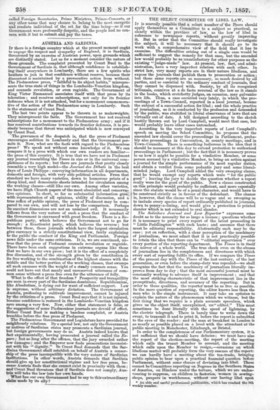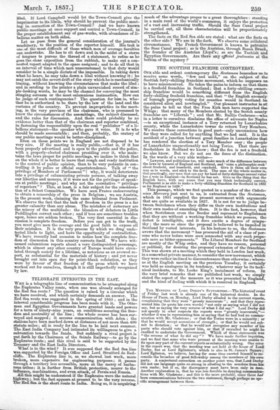THE SELECT COMMITTEE ON LIBEL LAW.
IT is scarcely possible that a select number of the Peers should apply themselves as a Committee to a subject so practical, so clearly within the province of law, as the law of libel in reference to newspaper reports, without greatly improving it. But in order that the Committee should really investigate the subject, it will be necessary that it should go to its work with a comprehensive view of the field that it has to examine. The frfficulties arising out of a single case would be sufficient to suggest the remedy for that case, but the amended law would probably be as unsatisfactory for other purposes as the existing " judge-made " law. At present, law, fact, and administration, have a very imperfect relation with each other. In strict law, very many reports are in their nature libellous, and expose the journals that publish them to prosecution or action; but those same reports are so necessary, so much desired by all parties, and so essential to the ordinary conduct of journals, that they cannot be dispensed with. Society, by all its recognized tribunals, connives at a de facto reversal of the law as it stands in the books, which erotehetty judges, on occasion, may galvanize into life. Thus, a case occurred very lately, in which the proeeedings of a Town-Council, reported in a local journal, became the subject of a successful action for libel ; and the whole practice of journalism, as it is conducted by the profession and demanded by the public, was stultified in literal observance of laws that are virtually out of date. A bill designed according to the sketch hastily thrown out by Lord Campbell, would meet that case, but would probably leave other cases untouched.
According to the very imperfect reports of Lord Campbell's speech on moving the Select Committee, he proposes that the amended law should cover the proceedings in Parliament, proba
bly also proceedings in Convocation, in county meetings, and in Town-Councils. There is something ludicrous in the idea that it should be necessary at this day to extend protection to authorized proceedings in Parliament; but the fact that it is necessary proves to us how it might be possible for a vindictive Member, or some person accused by a vindictive Member, to bring an action against a journal for the simple performance of its most regular duties, and obtain a verdict from some pedantic jury and some literalminded judge, Lord Campbell added the very sweeping clause, that he would exempt any reports which were "for the public good" ; leaving the jury to decide the question whether a report really were for the good of the public. Now a clause constructed on this principle would probably be sufficient, and more espeeially since the statute would be of a penal character, and would have to be construed strictly as in favour of the defendant. The chance is, however, that the clause will be so vague and so sweeping as to include every species of report ordinarily published in journals, down to penny:a-Bning, and would give a protection to printed slander which is not extended to oral slander.
The Solicitors Journal and Law Reporter * expresses some
doubt as to the necessity for so large a licence ; questions whether it is necessary to print every report of the latest proceeding in "Little Peddlington" with such haste ; and assumes that there must be editorial responsibility. Abstractedly such may be the case ; yet on reflection, with a clear perception of the machinery of journalism, we must admit that it is not practically possible to retain the idea that there can be "editorial supervision " over every portion of the reporting department. The Times is in itself the mirror of a whole world. The true check even on the abuses of journalism lies in the completeness and directness with which every sort of reporting fulfils its office. If we compare the Times of the present day with the Times of the last century, of the last generation, or even before the stamp-duty was repealed—we shall recognize the fact that the machinery of journalism literally improves from day to day ; that the most successful journal must be constantly working to advance itself in improvement ; and that the most striking characteristic of that improvement lies in the promptitude, directness, and accuracy of the reporting. But in order to those qualities the reporter must be as free as possible. In the mere question of? reporting, the editor knows less than the man who is the simple instrument. It may take an optician to explain the nature of the phenomenon which we witness, but the first thing that we require is a plain accurate speculum, which gives us the object itself, unexplained, un" edited." Thin must sometimes be done literally with the speed of lightning, by the electric telegraph. There is barely time to write down the event, to transmit it and to print it, before the report is submitted to the eyes of the reader and the man at breakfast in London is os nearly as possible placed on a level with the attendant at the public meeting in Manchester, Edinburgh, or Bristol.
In order to the completeness of our Parliamentary system, it is
not sufficient that we should have debates ; we must have also the report of the election-meeting, the report of the meeting which calls the truant Member to account, and the meeting which calls upon the Member to resign,—occasions on which libellous matter will probably form the very essence of the report: we can hardly have a meeting about the tea-trade, bringing public opinion to bear upon a practical financial question before Parliament, without some chance of deviating into libel. There cannot be Committees reporting on Negroes in the Southern States of America, on Hincloos under the torture, which we are endeavouring to suppress, on children in factories, women in sewingshops, paupers in workhouses, without our having libel upon * An able and useful professional publicatien, which has reached the 9th weekly number.
libel. If Lord Campbell would let the Town-Council give the imprimatur to its libels, why should he prevent the public meeting in correction of the Town-Council? And we have known public meetings at once support and control a Town-Council, in. the proper establishment say of gas-works, with abundance of libellous matter on both sides.
Let us pass from the general consideration of the journal's machinery, to the position of the reporter himself. His task is one of the most difficult of those which men of average faculties can nodertake. Ile has to sit down and in. the midst of a storm of tongues to pursue the thread of a statement, to refine as he goes the clear exposition from the rubbish, to make out a connected report adapted to the space assigned; and to do all that in an interval of time which men unaccustomed to that duty would consider to be a simple dictate of the impossible. In taking down what he hears, he may take down. a libel without knowing it ; he may not catch the covert drift of the story which he is mechanically tracing, without knowing the circumstances that make the libel ; and in sending to the printer a plain unvarnished record of simple-looking words, he may be the channel for conveying the most stinging sarcasm or the most calumnious insinuation. How can he judge of such contingencies? The question for him is, whether he la authorized. to be there by the law of the land and the customs of the country. To prevent improprieties in the meeting, is, the very province of the chairman, who is presumed to know the circumstancesof the assemblage, the subject discussed, and the rules for discussion. And there could probably be no evidence better than that of the chairman and reporter combined, in fastening the responsibility upon the real " publisher " of a libellous statement—the speaker who gave it voice. It is he who should be made accountable ; and then probably, the oratory of our public meetings would be better-disciplined. Even on those points we in England are not disposed to be very nice. If the meeting is really public,—that is if it has been properly advertised and is open to the public anclAhe police, with a properly-elected chairman presiding over it, who maintains the laws proper for public meetings, we incline to think that on the whole it is better to leave that rough and ready institution to the control of public opinion, than to be very pedantic in controlling it by police or official superintendence. Talk of "the privilege of Members of Parliament" ! why, it would deteriorate into a privilege of calumniating private persons, of talking away our liberties and moneys, if it were not for the privilege of speakers at public meetings ; and. why not the correlative privilege of reporters " ? This at least, is a fair subject for the consideration of a Select Committee. We have seen France endeavouring to Obtain a censorship of the press in Belgium ; we see Austria, in the present week, claiming the same tribunal from Piedmont. We observe the fact that the lack of freedom in the press is a far greater calamity than any abuse. The mistakes of autocracy are the misery of the multitude: the blunders of debaters in Little Peddlington correct each other; and if toes are sometimes trodden upon, bones are seldom broken. The very first essential in discussion is complete freedom. Before you can get to the truth, you must give men the courage and the food faith to expose all their mistakes. It is the very process by which we drag undetected libels to light, and have the opportunity of contradiction. We have recently had occasion to notice how the complete freedom of discussion in this country corrects itself. We have witnessed calumnious reports about a very distinguished personage, which in almost any other country of Europe would have =colated, through society for a lifetime as notorious as an avowed report, as substantial for the materials of history ; and yet never brought out into open day for point-blank refutation, as they were by favour of that freedom of the press which we have worked out for ourselves, though it is still imperfectly recognized by law.



























 Previous page
Previous page